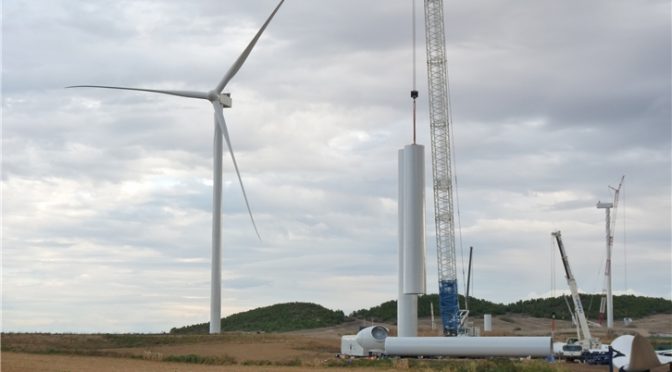The European Investment Bank (EIB) has taken another step forward in the promotion of clean energy production in Spain. The EU bank will provide EUR 50m in financing to Renovables de la Ribera, a 50-50 joint venture between Iberdrola and Caja Rural de Navarra to build a new renewable energy project – the Cavar wind complex – in Navarra, Spain.
The EIB is assisting this project via a Green Loan, the features of which are fully in line with the requirements set out in its Climate Awareness Bonds programme. As a result, it is likely to be allocated to its portfolio of loan operations financed via the issuance of these bonds.
The new project, located between the municipalities of Cadreita and Valtierra, includes four wind farms and will have an installed capacity of 111 MW. Construction will enable the creation of up to 200 jobs and the complex is expected to become operational in the first quarter of 2020.
In this way, the EU bank financing provided to Renovables de la Ribera will help meet the goal proposed by the European Commission of generating 32% of the energy used in the EU using renewable sources by 2030. The new wind complex – which will not release any polluting emissions – will generate enough clean energy to meet the electricity needs of 46 500 people and will avoid the release 84 000 tonnes of CO2 into the atmosphere a year.
Cavar is also the first wind project in Spain to sell its energy to a large corporation. A long-term bilateral contract (a Power Purchase Agreement or PPA) will see it produce 40 MW of clean energy for Nike in Europe.
EIB Vice-President Emma Navarro, who is responsible for climate action at the Bank, said: “Spain has major renewable energy potential, and the EIB wants to help it to become a reference point in the sector by providing investments to promote the transition to a low-carbon economy while simultaneously fostering growth and employment. Promoting clean energy generation is one of our key priorities. As part of its aim to establish itself as the EU climate bank, the EIB has reaffirmed its commitment to increasing its financing to support Europe in its plans to become the first carbon-neutral continent by 2050.”
Iberdrola España CEO Ángeles Santamaría highlighted “the importance of access to climate financing instruments to accelerate the energy transition we need. These measures, together with emissions targets and the implementation of an environment-focused industrial and fiscal policy, will make it possible to move forward with the decarbonisation of our economy and climate change mitigation. In line with this commitment and an ambitious action plan, Iberdrola is making progress with major investment into renewables in Spain, where we plan to install 3 000 MW of new capacity by 2022 and up to 10 000 MW in 2030.”
For Caja Rural de Navarra, “investment
in this renewable energy production activity falls under our focus on
environmental responsibility and support for regional business. This
rural operation balances traditional farming with new, environmentally
friendly forms of energy generation.”
The EIB and climate action
The EIB is among the world’s largest multilateral providers of climate finance. The Bank’s goal is to be a leader in mobilising the finance needed to keep global warming to under 2 ?C and limit temperature rises to 1.5 ?C to meet the Paris Agreement objectives. On 14 November, the EIB Board of Directors approved its new climate objectives and the new energy lending policy. The Bank will gradually increase its financing for climate and environmental objectives up to 50% by 2025, with the goal of ensuring that the EIB Group mobilises at least EUR 1bn by 2030 to promote investments helping to meet these objectives. It also announced its intention to align all EIB Group activities with the Paris Agreement. To this end, the EIB will cease financing fossil fuel-based projects from late 2021.
In 2018, the EIB provided almost EUR 1.3bn to support climate action in Spain by financing projects involving the development of cleaner means of transport and implementation of new, less polluting and more environmentally friendly production processes.
The European Investment Bank (ElB) is the long-term lending institution of the European Union owned by its Member States. It makes long-term finance available for sound investment in order to contribute towards EU policy objectives.


